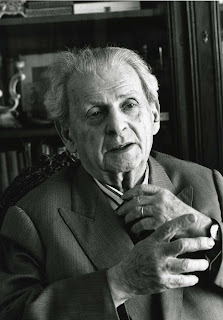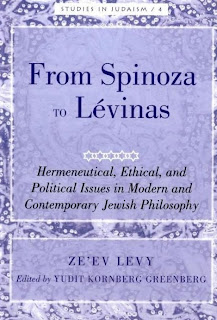Emmanuel Levinas (1906 - 1995) - "il existe une trahison de Spinoza" - ontwaarde in Spinoza ook een latent anti-Spinozisme
“Bible criticism can ruin only
a faith that has already been weakened.”
Emmanuel Levinas, “The
Spinoza case” ["Le Cas Spinoza"]
"while there may be numerous
interpretations of Spinozism itself, they do not exclude its truth
but testify to it."
Emmanuel Levinas, "L'Arrière-plan
de Spinoza," ["Spinoza's Background," slotzin]
 Op Levinas heb ik het niet zo;
hij is bepaald niet mijn filosoof en ik sla hem dus over. Maar af en
toe kom ik toch iets tegen over wat - volgens sommige de grootste
joodse filosoof van de 20e eeuw, Levinas, over Spinoza heeft gezegd.
Dus moet het toch een keer van een blog over hem komen; overwegend
uit de tweede hand (uit secundaire literatuur), want gelezen heb ik
hem nauwelijks. Maar door het lezen van teksten van hemzelf voor het
schrijven van dit blog, ontdekte ik dat Levinas minder negatief over
Spinoza was dan het lijkt (en/of dan ik meende).
Op Levinas heb ik het niet zo;
hij is bepaald niet mijn filosoof en ik sla hem dus over. Maar af en
toe kom ik toch iets tegen over wat - volgens sommige de grootste
joodse filosoof van de 20e eeuw, Levinas, over Spinoza heeft gezegd.
Dus moet het toch een keer van een blog over hem komen; overwegend
uit de tweede hand (uit secundaire literatuur), want gelezen heb ik
hem nauwelijks. Maar door het lezen van teksten van hemzelf voor het
schrijven van dit blog, ontdekte ik dat Levinas minder negatief over
Spinoza was dan het lijkt (en/of dan ik meende).
Benjamin Hutchens, die meermalen over Levinas schreef, bracht ook uit: Levinas: A Guide for the Perplexed.1) Daarin schrijft hij: "Of other major thinkers influencing Levinas's work, the most important might be Hegel, Kant and Spinoza. The great German idealist Hegel was discovered by Levinas's generation, especially under the massive influence in France of Alexander Kojeve and Jean Hyppolite. Enormous chunks of Levinas's texts are glosses on Hegel's notions of being, personal identity and language. Interestingly. Levinas's ethics has not been contrasted sufficiently with Kantian deontological notions of the moral law as often as one might suspect. The greatest modern ethicist is an important presence throughout Levinas's work, and in many ways Levinas is a reluctant Kantian. Finally, the philosophical language of the Jewish metaphysician Baruch de Spinoza is interwoven throughout Levinas's later books, especially Otherwise than Being or Beyond Essence. [p. 11] Over dat laatste boek zodadelijk. Eerst het begin.
Met een tussentijd van ruim tien jaar verschenen twee essays van Levinas over Spinoza:
• in 1955 "Le Cas Spinoza" [The Case of Spinoza"]. Hierin sprak hij een veroordeling erover uit dat Spinoza verraad had gepleegd ["il existe une trahison de Spinoza"]. Hij nam hem kwalijk dat hij het jodendom voor het christendom had ingeruild. En dat het jodendom alleen diende om de Bijbelse gehoorzaamheid en naastenliefde te illustreren. Daarin is ook bovenstaand motto te lezen: “Bible criticism can ruin only a faith that has already been weakened. Does not the truth of eternal texts shine forth all the more when they are denied the external support of a dramatic and theatrical revelation? When they are studied for themselves, do they not bear witness to the divine value of their inspiration and the purely spiritual miracle of their union?” (Levinas, “The Spinoza Case” Difficult Freedom, 107). Voor Levinas is de Torah méér en vooral 'anders goddelijk' dan voor Spinoza.
• in 1966 "Avez-vous relu Baruch?" [Have You Reread Baruch?] Dit was vooral een commentaar op Sylvain Zac's dissertatie Spinoza et l'interpretation de l'écriture [Paris, Presses Universitaires de France, 1965]. Levinas besluit zijn essay met deze eindnoot: "Even Spinoza's philosophy must not guide the reading of the Bible, the intelligibility of which is absolutely not of the same order as philosophy. In a very lovely final chapter, Zac shows that Spinoza could not restrain himself from offering his exegesis in the spirit of his philosophy. In the same way it is true that even the Scripture interpreted by the Scripture cannot do without philosophy. Philology is not possible without philosophy."
Volgens Hent de Vries, op wiens hoofdstuk "Levinas, Spinoza, and the Theologico-Political Meaning of Scripture" 2) ik mij vooral baseer, zou Levinas, geïnspireerd door Zac in de TTP en de Ethica een zeker, hoewel latent of verkapt anti-Spinozisme ontwaren! Of anders gezegd, zouden een Spinozisme en een zeker anti-Spinozisme elkaar dan wellicht niet in evenwicht gehouden, maar wel gedeeltelijk corrigeren. En De Vries werkt dit verder uit om zo het zgn. algemeen verspreide anti-Spinoza-beeld van Levinas te nuanceren. [Wel zegt hij erbij dat het vooral zijn eigen interpretatie is, die niet sterk door tekstuele evidenties overtuigend ondersteund wordt.]
• in 1974 Autremont qu'être ou au-dela de l'essence. [Otherwise than Being or Beyond Essence]. Hierin wordt Spinoza niet genoemd, maar gaat het wel uitvoerig over de conatus essendi. 3)
• in 1976 "Jean Lacroix: Philosophic et Religion," in: Noms propres [Montpellier: Fata Morgana, 1976), 119-30], waarin hij een reactie gaf op Jean Lacroix's Spinoza et le probleme du salut, waarin dus veel Spinoza voorkomt. 4) We lezen in de vertaling "Spinoza is the first messenger of the death of a God bearing the well-known resemblance to man spoken of in Genesis. The understanding of Scripture through Scripture, which is propounded in the Theological-Political Treatise, means that it is forbidden to seek philosophical concepts in Scripture." De goddelijkheid van het zijn of de natuur is de zuivere positiviteit van het esse. [..] "it is a totality without beyond..."
Almaar meer blijkt Levinas een ambivalente houdingen t.o.v. Spinoza te hebben: hij verwerpt diens één-substantie ontologie, vindt dat teveel een totalitair-gesloten systeem, waarin een mens slechts een radertje in de machine is. Maar hij omarmt Spinoza's Bijbelhermeneutiek. Dat blijkt nog eens uit de laatste tekst, waarin Spinoza voorkomt:
• in 1982 "L'Arrière-plan de Spinoza," in: L'Au-delà du verset: Lectures et discours talmudiques (Paris: Minuit, 1982) 5), waarin hij nader ingaat op Spinoza's biografie n.a.v. de publicatie van Vaz Dias en Van der Tak. Sylvain Zac noemt hij zijn vriend. Hij schetst de tegenwoordige hermeneutiek, waarvoor Spinoza de eerste beginselen bracht. En eindigt, duidelijk niet-negatief over Spinoza op wie hij dezelfde hermeneutiek toepast met: "while there may be numerous interpretations of Spinozism itself, they do not exclude its truth but testity to it." [p.173 van "Spinoza's Background"]
Uiteindelijk overstijgt volgens Hent de Vries Levinas' waardering voor Spinoza's bijdrage aan de moderne hermeneutiek van de Bijbel zijn boosheid over Spinoza's verraad. Levinas zegt het Mendelssohn na: het jodendom is een geopenbaarde Wet en geen theologie - en hij weet dat die dat had gedestilleerd uit Spinoza.
____________
 Noten
Noten
1) Benjamin Hutchens, Levinas: A Guide for the Perplexed. Continuum, 2004 [ books.google].
Benjamin Hutchens, "Infinition and apophansis - Reverberations of Spinoza in Levinas THE ETHICS OF EMMANUEL LEVINAS." In: Colloquium on Emmanuel Levinas, UNIV LONDON, INST ROMANCE STUDIES, LONDON, ENGLAND, MAY 18, 1995. Published in: Seán Hand, Facing the Other: The Ethics of Emmanuel Levinas. Routledge Chapman & Hall, 1996, reprint 2011, pp. 107-120. [Cf. info aangevuld vanuit 1)]
2) Hent de Vries, "Levinas, Spinoza, and the Theologico-Political Meaning of Scripture". In: Hent de Vries & Lawrence Eugene Sullivan (Eds.), Political Theologies: Public Religions in a Post-secular World. Fordham Univ Press, 2006, p. 232 - 248 [geheel te lezen in books.google]
3) Autremont qu'être ou au-dela de l'essence. [Otherwise than Being or Beyond Essence]. [books.google]
4) Vertaald: "Jean Lacroix: Philosophy and Religion," Proper Names, trans. Michael B. Smith (Stanford: Stanford University Press, 1996), 80-89. [Cf. books.google laat precies dit essay in z'n geheel lezen]
5) "L'Arrière-plan
de Spinoza," in L'Au-delà du verset: Lectures et discours
talmudiques. Paris: Minuit, 1982, 201-6; "Spinoza's
Background," in Levinas, Beyond the Verse: Talmudic Readings
and Lectures, trans. Gary D. Mole. Bloomington: Indiana
University Press, 1994, 168-73. [cf. books.google
dat eerder dit hoofdstuk in z'n geheel, maar nu nog slechts gedeeltelijk laat inzien]
Deze tekst was oorspronkelijk
een lezing in 1977: Reponse au Professeur McKeon," in Nathan
Rotenstreich and Norma Schneider, eds., Spinoza: His Thought and
Work, Entretiens in Jerusalem, 6-9 September 1977 (Jerusalem:
Publications of the Israel Academy of Sciences and Humanities, 1983),
47-52,
En er is:
 Levy, Ze'ev, From Spinoza to
Lévinas. Hermeneutical, Ethical, and Political Issues in Modern
and Contemporary Jewish Philosophy. Edited by Yudit Kornberg
Greenberg. Peter
Lang [Series: Studies in Judaism - Volume 4], 2009
Levy, Ze'ev, From Spinoza to
Lévinas. Hermeneutical, Ethical, and Political Issues in Modern
and Contemporary Jewish Philosophy. Edited by Yudit Kornberg
Greenberg. Peter
Lang [Series: Studies in Judaism - Volume 4], 2009
books.google laat niet zien of hij veel info geeft over of vergelijkingen maakt tussen Levinas en Spinoza: alleen hun verschillende kijk op de dood wordt zichtbaar.


Reacties
Het hele clubje (Emanuel Levinas, Sylvain Zac en Ze'ev Levy) heb ik enkele keren mogen ontmoeten. Met geen van de drie kon ik, bij wijze van spreken, door één filosofische deur. Maar, Stan, stoor je maar niet aan mijn afkeer van hun type van omgang met Spinoza. Ik ben ook maar een mens. Nil humani a me alienum est.
Wim Klever 19-09-2013 @ 21:46